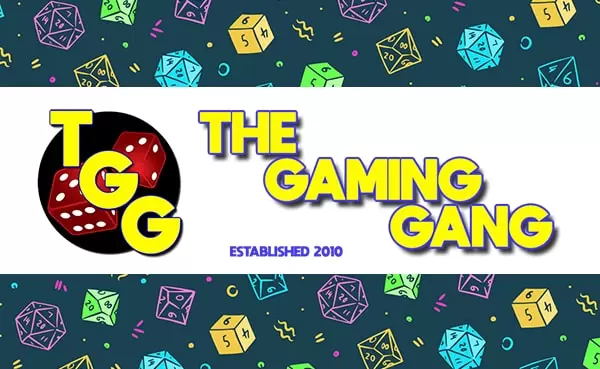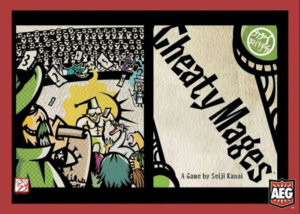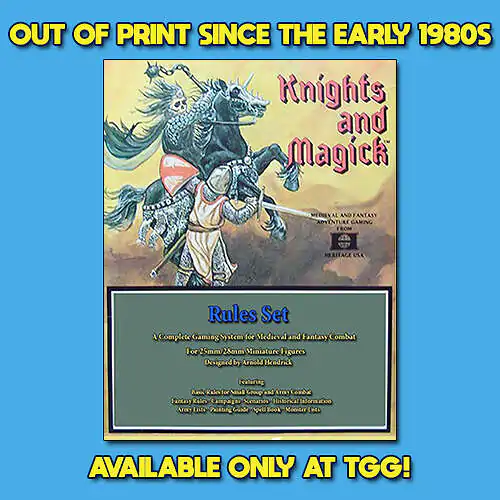Publisher: Alderac Entertainment Group
Designer: Seiji Kanai
Artist: Noboru Sugiura
Year: 2013 (Original edition released in 2008 by Japon Brand)
Genre: Cutthroat card game of bluffing and betting
Players: Three to six players
Ages: 12+
Playing Time: 15 – 30 minutes
MSRP: $19.99
Cheaty Mages is another AEG release in their Big in Japan line of games. Originally published as Ikasamage! In 2008, the title puts three to six players in the roles of mages attending a night at the arena during which each will look to score the most loot betting on the combatants while tossing spells (under the table so to speak) to insure a win.
TGG INSIDE THE BOX
Click here for the podcast review.
Each of the fights involves five of ten randomly selected combatants, who range in aptitude from the lowly Goblin to the mighty Dragon. Players will secretly bet on one, two, or three of these monsters to pull off a win where the weaker the initial strength of the fighter, the bigger the payout in the case of victory. Each mage isn’t going to sit back and simply watch the proceedings but actively cast spells to empower, weaken, or otherwise tilt the odds of the monsters in the fight.
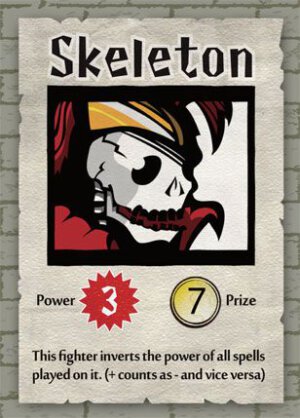
Play begins with each player receiving their five Betting cards, numbered one through five, in which they’ll use to place wagers. Then the Spell cards, Fighter cards, and Judge cards are shuffled and placed to the side in their respective decks. Depending on the number of players, each then draws anywhere from five to eight Spell cards; the more players, the fewer cards drawn. Five Fighters are drawn and placed in a row and the monster’s place in the row corresponds with the Betting cards played. For example, if the Dark Elf is in the four spot and you lay down the number four Betting card, you’re wagering on the Elf winning the bout. Finally you select the top Judge card and they’ll be over seeing the fight.
Judges vary in their allowance of magic anywhere from letting everything go to being very strict on the types of Spells and/or total amount of Mana which can be cast upon a single creature. Some Judges will eject a creature over the Mana limit while others will simply dispel the spells cast on the creature. A few Judges have very specific rules as well which require a closer look at their card to make sure everyone knows what to expect from them.
Players can wager on as many as three of the five combatants but the more creatures you bet on the lower your payout will be if any of them win. Betting on one creature earns you double their payout, betting on two pays the indicated winnings, and betting on three only earns you half. Using the earlier example of the Goblin and Dragon, if you were to bet on the Goblin, and the Goblin alone, if he wins you would receive twenty coins since his card indicates a payout of ten. If you were to bet on three creatures, and say one was the Dragon, and the Dragon won you’d only receive two coins; the dragon has a payout of three but since you bet on three monsters you only get half, rounded up.
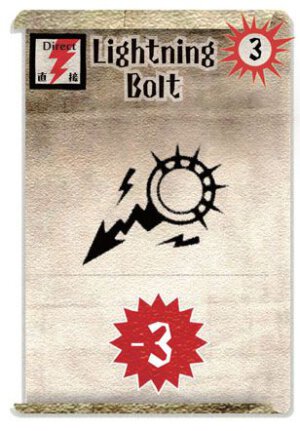
Once the players have their spell cards, combatants and Judge selected, and placed their bets the bout will begin.
As the match begins, each player will in turn either cast a Spell, discard a Spell in order to look at enchantments on a single creature, or pass. This sequence continues until all players have passed and that indicates the match has ended.
Once the match has concluded all the Spells cast on each Fighter are flipped face up and Mana surges totaled to see if the Judge dispels the magic or ejects the Fighter. Any remaining Fighters have the cumulative effects of Spells totaled and the monster with the highest Power is declared the winner. In the case of a tie the creature with the highest base Power is the victor. Winnings, if any, are paid out to the players and everyone draws more Spell cards (four in a 3-4 player game and three in 5-6 player games) but only to their hand limit (eight with 3-4 players and six with 5-6 players).
Three arena battles comprise the game and after the third bout coins are tallied to declare the winning mage.
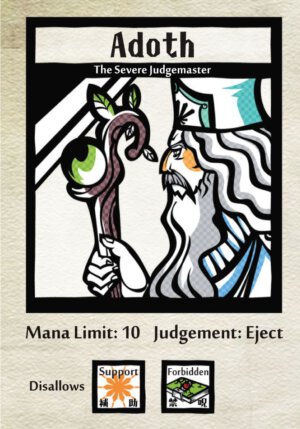
The action is Cheaty Mages is fast and furious with an entire game lasting no more than fifteen to thirty minutes once everyone has the hang of the rules. I will point out there can be a touch of a runaway factor if someone scores big money after the first match and the final round can turn out pretty predictable if players only have one betting avenue in order to catch up. Possibly adding a house rule where each player begins the game with three coins and backing each losing monster costs you a coin could alleviate that problem a wee bit. The runaway factor doesn’t rear its head often but it does happen enough to warrant a mention.
Cheaty Mages is a fun wind up/wind down game and should appeal to just about any gamer. If you enjoy Kenai’s other design, Love Letter, then picking this title up is a no brainer. If Love Letter was a touch too light for you and your own gaming gang be sure to give Cheaty Mages a try because there’s quite a bit more under the hood in this design. Everyone I played this with has gotten a big kick out of the little card game!
